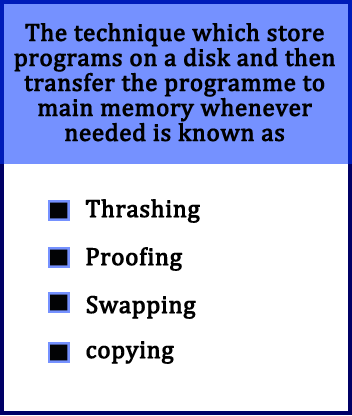The technique which store programs on a disk and then transfer the programme to main memory whenever needed is known as ... This post is in response to Anil Kumar's email who asked "the technique which store programs on a disk and then transfer the program to main memory whenever needed is known as" with four possible options:
- Thrashing
- Proofing
- Swapping
- copying
Correct Answer
Swapping

Explanation
Question offers four options. Out of them, Proofing and Copying are too generic and can't be correct answer.
Proofing means reading each word (and punctuation mark) in a document slowly and carefully while looking for errors. It means focusing on the surface of your text, not on the content.
Copying is the duplication of information or an artifact based only on an instance of that information or artifact, and not using the process that originally generated it.
The confusion then, is between the two options - thrashing and swapping.
Show your love! Share this page!
Swapping is a useful technique that enables a computer to execute programs and manipulate data files larger than main memory. The operating system copies as much data as possible into main memory, and leaves the rest on the disk. When the operating system needs data from the disk, it exchanges a portion of data (called a page or segment) in main memory with a portion of data on the disk. Swapping is often called paging.
Thrashing is a situation when there is an excessive amount of page swapping between main memory and secondary storage and the operation becomes inefficient. Thrashing occurs when the system does not have enough memory, the system swap file is not properly configured, too much is running at the same time, or has low system resources.
Thus, for the question, swapping is the correct answer.
Susanta says
What is spooling
Susanta says
I thnk the right answer is spooling, is it right
Suresh Khanal says
Susant,
Spooling do not brind data back to the memory. Spooling is the technique so that processor is free to do other tasks while I/O devices are busy.